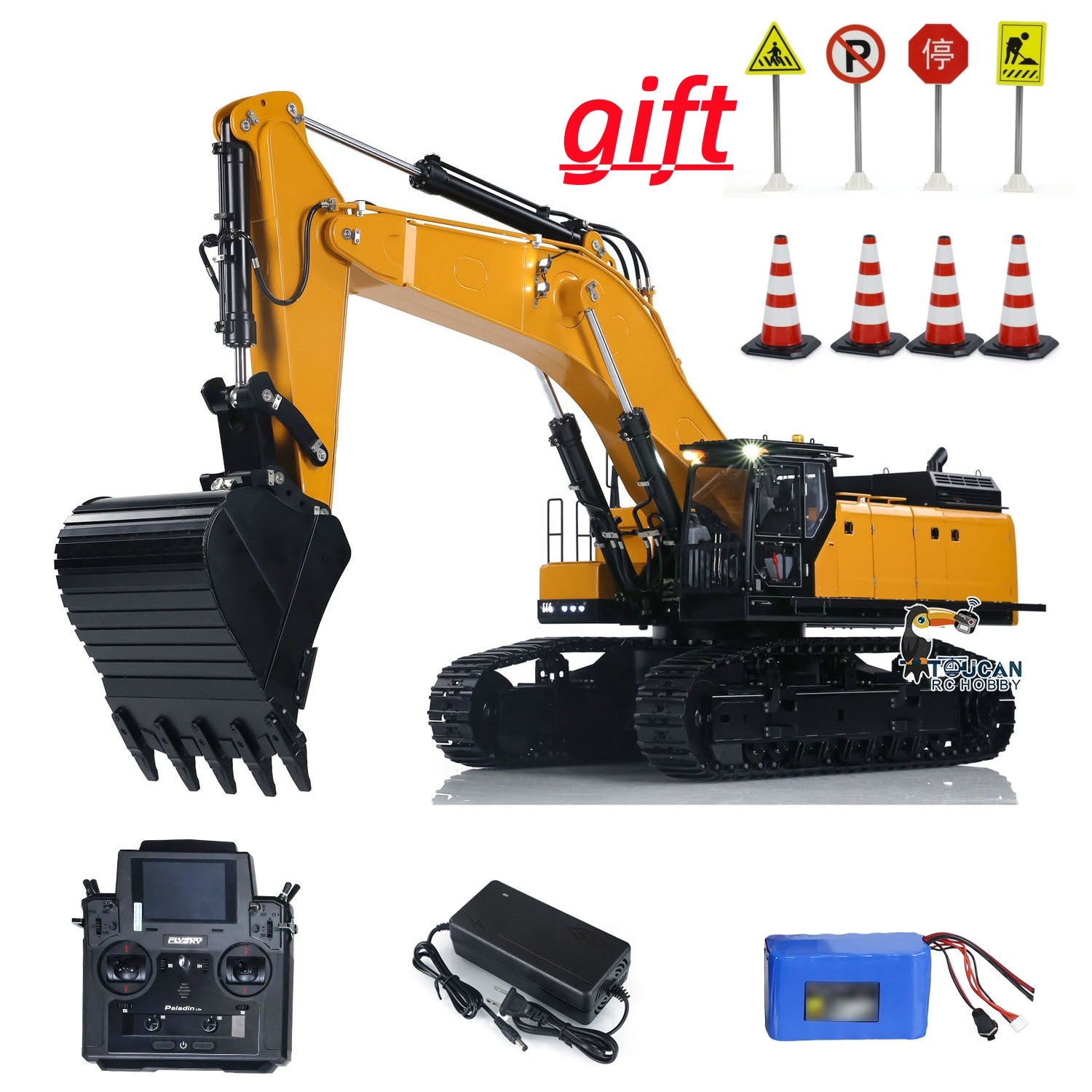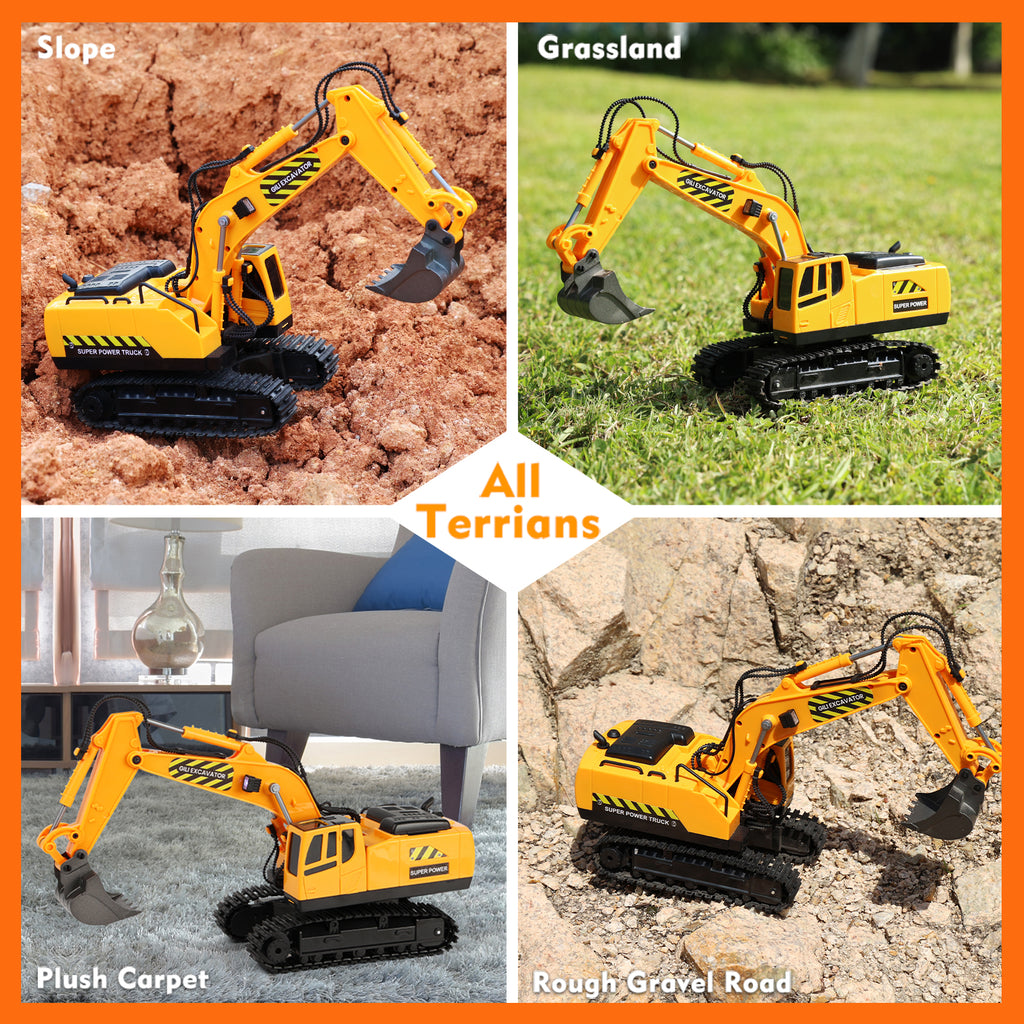Top Features of the remote control excavator That Can Enhance Your Project
Wiki Article
Discover the Value of Excavator in Modern Building Projects
Excavators are crucial tools in modern construction jobs. Their versatility permits them to carry out a broad array of tasks, from excavating and grading to demolition and website prep work. Advanced functions, such as hydraulic add-ons and GPS, enhance their capacities and effectiveness on work websites. As the sector advances, the significance of excavators expands much more. Understanding their function can expose insights right into the future of building methods. What lies in advance for these devices?The Convenience of Excavators in Numerous Projects
Excavators are frequently linked with massive construction projects, their adaptability enables them to be used in a large variety of applications, from household landscaping to utility maintenance. In metropolitan settings, excavators can navigate limited areas to dig structures for homes or mount drain systems. Their capacity to perform fragile tasks makes them optimal for landscape design tasks, where they can excavate for fish ponds or plant trees. Additionally, excavators play an important duty in energy upkeep, effectively digging trenches for pipelines or cable televisions without disrupting bordering locations. In agricultural applications, they aid in land clearing up and soil preparation. Furthermore, their versatility enables them to be geared up with various add-ons, boosting their functionality throughout various jobs. This multifaceted nature of excavators not only enhances numerous construction procedures yet likewise shows their integral duty in modern-day infrastructure development and upkeep.Trick Functions and Kinds of Excavators
The conversation on essential functions and kinds of excavators highlights the crucial features that make these devices very useful in building and construction. Various excavator kinds, each designed for certain jobs, demonstrate their adaptability and efficiency throughout various applications. rc excavator. Understanding these categories and features is essential for maximizing their usage in modern building jobsExcavator Types Summary
Excavators play a pivotal function in modern-day construction, providing convenience and efficiency throughout various jobs. These heavy equipment systems can be found in several types, each tailored for certain applications. One of the most typical kinds include spider excavators, understood for their stability on uneven terrain, and wheeled excavators, which give better mobility on paved surface areas. Small excavators are preferred for limited spaces and small-scale projects, while long-reach excavators are developed for deep excavating. Furthermore, there are specialized excavators, such as hydraulic excavators, which boost power and accuracy. Each kind includes unique abilities, making them crucial for jobs ranging from digging and grading to demolition and product handling. Comprehending these variants permits construction specialists to pick the right excavator for their job needs.Key Includes Explained
Comprehending the essential functions of excavators enhances their reliable application in construction tasks. Excavators are defined by their effective hydraulic systems, which provide the necessary pressure for digging, lifting, and relocating products. Their verbalized arms permit a vast array of activity, promoting specific procedures in confined rooms. In addition, the selection of add-ons, such as containers, grapples, and augers, broadens their adaptability to meet different task demands. The size and weight of excavators likewise contribute to their stability and ability to move on different terrains. Furthermore, advancements in technology have actually caused the combination of GPS and automation, improving precision and effectiveness in excavation jobs. These features jointly place excavators as indispensable tools in modern-day construction.Applications in Building and construction
Transforming building and construction websites, excavators play a critical duty throughout numerous applications, ranging from property building tasks to large-scale facilities advancements. These flexible machines are outfitted for tasks such as digging foundations, trenching for energies, and site grading. Different sorts of excavators, consisting of crawler, wheeled, and mini excavators, offer particular benefits tailored to the project needs. Crawler excavators master harsh surfaces, while wheeled excavators use flexibility on smooth surface areas. Miniature excavators are excellent for confined rooms, making them prominent in city setups. The effectiveness and power of excavators considerably accelerate building procedures, making certain prompt task conclusion. Their flexibility further improves their value, allowing construction teams to tackle a diverse array of challenges effectively.Enhancing Efficiency and Productivity on Job Sites
Optimizing performance and performance on work websites is an important goal in contemporary building. Excavators play an essential duty in attaining this objective by streamlining various jobs. Their ability to carry out several functions-- such as excavating, grading, and lifting-- reduces the requirement for added equipment, consequently saving time and resources.Moreover, excavators boost process by permitting faster completion of tasks. With sophisticated functions like hydraulic attachments and general practitioners modern technology, they can carry out precise procedures that decrease mistakes and revamp. This precision not just enhances the quality of work yet also maximizes material usage, adding to set you back savings.The adaptability of excavators allows them to adjust to various site problems, making sure that projects advance smoothly no matter challenges. By incorporating excavators into building procedures, teams can greatly enhance their total productivity, leading to prompt project conclusion and enhanced earnings.Safety Benefits of Making Use Of Excavators
Excavators significantly improve safety and security on construction websites through enhanced driver presence and decreased hands-on labor threats. By providing operators with a clear view of their environments, excavators aid to stop injuries and crashes. Additionally, the machinery decreases the need for workers to involve in hazardous hand-operated tasks, better promoting a safer work setting.Boosted Driver Presence
Although construction websites can be disorderly and loaded with possible risks, boosted operator visibility plays a necessary function in making sure safety when making use of excavators. Modern excavators are developed with large, unobstructed home windows and purposefully positioned mirrors, permitting drivers to keep a clear view of their surroundings (rc excavator). This enhanced exposure is essential for spotting pedestrians, other equipment, and numerous barriers, substantially minimizing the danger of accidents. Additionally, many excavators include sophisticated innovation, such as video cameras and sensors, to provide drivers with extra perspectives, better boosting awareness. The ability to see more plainly not just help in reliable operation yet also promotes a safer workplace, making it less complicated for operators to browse intricate building and construction sites without endangering safety criteriaDecreased Manual Work Dangers
When hand-operated labor is decreased through using excavators, many security benefits arise, substantially boosting the health of construction employees. Excavators decrease the physical pressure connected with hefty lifting and recurring tasks, successfully decreasing the threat of musculoskeletal injuries. By automating processes such as digging, grading, and relocating products, they enable workers to maintain a much safer range from possible risks. Additionally, excavators are furnished with innovative safety attributes, such as rollover defense systems and boosted operator comfort designs, which additionally secure employees on website. The result is a substantial reduction in office accidents and injuries, resulting in boosted performance and spirits amongst building and construction groups. Inevitably, the adoption of excavators adds to a safer and much more effective building atmosphere.Excavators in Earthmoving and Site Preparation
In modern construction, a significant portion of earthmoving and website prep work jobs relies upon the effectiveness and convenience of excavators. These equipments are made to manage numerous dirt kinds and surface, making them indispensable for grading, digging, and trenching activities. Their hydraulic arms can be geared up with various add-ons, such as pails and augers, permitting operators to customize their method based on particular task requirements.Excavators succeed at relocating large volumes of planet promptly and effectively, which accelerates the overall building and construction timeline. They can browse tight rooms and testing sites where traditional tools might struggle, boosting efficiency. Furthermore, the precision of excavators assurances that website preparation sticks to rigorous requirements, decreasing the danger of errors that could bring about costly rework.The Role of Excavators in Demolition Tasks
Excavators play a vital function in demolition tasks, as they have the power and dexterity needed to dismantle structures efficiently. Outfitted with different attachments such as hydraulic breakers, shears, and grapples, these makers can adapt to various demolition demands, whether for small structures or big commercial sites. Their versatility enables operators to take on complicated projects while keeping security and precision.In addition to their demolition capacities, excavators assist in debris removal, ensuring that work websites continue to be orderly and secure. By damaging down frameworks right into manageable pieces, they permit streamlined clearing and recycling of products, aligning with contemporary sustainability efforts.Moreover, excavators can access tight areas and browse irregular terrain, making them crucial in urban demolition jobs. On the whole, their robust design and multifunctionality make excavators an essential asset in the demolition stage of construction, contributing substantially to task timelines and effectiveness.

Future Fads in Excavator Modern Technology and Usage
As the construction sector evolves, improvements in excavator modern technology are positioned to change their usage and effectiveness noticeably. One significant trend is the integration of automation and expert system, allowing excavators to run with minimal human treatment. This shift rc excavator will certainly enhance precision in jobs such as grading and trenching, reducing human error and enhancing productivity.Additionally, the surge of electric and hybrid excavators is forming a more lasting building and construction setting, reducing carbon discharges and fuel costs. Enhanced telematics systems are additionally arising, making it possible for real-time monitoring of machine performance and maintenance needs, which can result in much better operational effectiveness and longer equipment lifespan.Moreover, innovations in accessory modern technology are broadening the flexibility of excavators, permitting them to carry out a broader range of tasks. The mix of these patterns shows a future where excavators are smarter, greener, and much more adaptable, eventually reshaping construction task characteristics.
Regularly Asked Inquiries
Just How Do Excavators Contrast to Various Other Building And Construction Equipment?
Excavators, characterized by their adaptability and power, excel in digging and earthmoving contrasted to other equipment. Their ability to execute various jobs, including lifting and demolition, makes them essential in building and construction tasks, boosting overall performance.
What Is the Ordinary Life Expectancy of an Excavator?
The ordinary life-span of an excavator typically ranges from 7,000 to 10,000 operating hours, relying on maintenance, use conditions, and design. Proper care can extend this life-span, guaranteeing peak efficiency throughout its operational years.How Are Excavators Kept for Ideal Efficiency?
Excavators require routine maintenance for peak efficiency, including regular evaluations, liquid checks, filter replacements, and timely fixings. Applying a precautionary maintenance schedule helps prolong their life-span and guarantees reliable operation in different construction settings.What Are the Prices Connected With Acquiring an excavator vs. renting out?
The expenses related to buying an excavator versus renting out vary considerably. Renting out deals reduced upfront expenditures but can gather over time, while acquiring requires a significant initial investment, however provides long-lasting cost savings and asset possession benefits.What Training Is Needed to Run an Excavator?
Operating an excavator calls for specialized training, usually including security methods, equipment procedure strategies, and environmental awareness. Certification programs often mandate sensible experience, making it possible for operators to deal with numerous tasks successfully while making sure compliance with sector regulations. The most common kinds include crawler excavators, understood for their stability on irregular surface, and wheeled excavators, which supply better mobility on smooth surface areas. Mini excavators are favored for small-scale projects and limited areas, while long-reach excavators are designed for deep digging. Furthermore, there are customized excavators, such as hydraulic excavators, which boost power and precision. Various types of excavators, including spider, wheeled, and mini excavators, provide details benefits tailored to the task demands. Crawler excavators succeed in harsh terrains, while wheeled excavators offer mobility on smooth surface areas.Report this wiki page